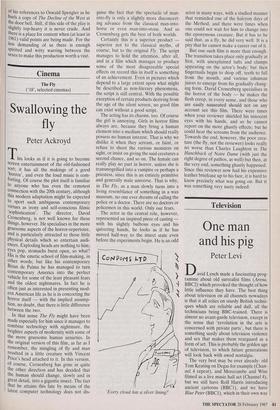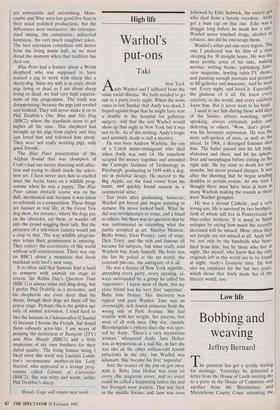Television
One man and his pig
Peter Levi
David Lynch made a fascinating prog- ramme about old surrealist films (Arena, BBC2) which provoked the thought of how little influence they have. The best thing about television on all channels nowadays is that it all relies on sturdy British techni- ques which are reliable and dull, all the technicians being BBC-trained. There is almost no avant-garde television, except in the sense that 'revolution in the arts is concerned with private parts', but there is something seedy about television violence and sex that makes them 'rearguard as a form of art. This is probably the golden age of television, to which future generations will look back with awed nostalgia.
The very best may be over already: old Tom Keating on Degas for example (Chan- nel 4 repeat), and Morecambe and Wise filmed as a live music hall act (Channel 4), but we still have Rolf Harris introducing ancient cartoons (BBC1), and we have Blue Peter (BBC1), which in their own way
are unbeatable and astonishing. More- cambe and Wise were less good live than in their usual polished productions, but the differences were instructive: the extempo- rised timing, the cumulative, unhurried funniness, the very much naughtier jokes. The best television comedians still derive from the living music hall, so we must dread the moment when that tradition has died out.
Blue Peter had a feature about a Welsh shepherd who was supposed to have trained a pig to work with sheep like a sheep-dog. Since my wife is as crazy about pigs living or dead as I am about sheep living or dead, we had very high expecta- tions of this programme. The truth was disappointing, because the pigs just rootled and honked. They will never make it on to Phil Drabble's One Man and His Dog (BBC2) where the standards seem to get higher all the time. This shepherd had brought up his pigs from piglets and they just loved him and followed him about. They were not really working pigs, only good friends.
The Blue Peter presentation of the Afghan hound that was champion of Cruft's had our terrier slavering with affec- tion and trying to climb inside the televi- sion set. I have never seen him so excited since the Arctic foxes on a wildlife prog- ramme when he was a puppy. The Blue Peter canine obstacle course was on the dull, mechanical side because it was taken so solemnly as a competition. These things are funnier in real life, at the Great Tew dog show, for instance, where the dogs pee on the obstacles, eat them, or wander off into the crowd wagging their tails. But the presence of a television camera would put a stop to that. The way wildlife program- mes retain their genuineness is amazing. They convey the eccentricity of this world without self-consciousness. There was one on BBC1 about a mountain that feeds mankind with bird's nest soup.
It is often said that humans find it hard to compete with animals on stage or screen. Sir Robin Day's Question Time (BBC1) is always tense and ding-dong, but I prefer Phil Drabble as a presenter, and his shepherds are even nicer than his sheep, though their dogs act them off the grassy stage. Perhaps this is the golden age only of animal television. I tried hard to like the humans in Choteauvallon (Channel 4) because I favour the French, but found them odiously actor-like. I am weary of praising the perfection of Rumpole (ITV) and Miss Marple (BBC1) and a little suspicious of my own fondness for their dated quality. The living human being I liked most this week was Lucinda Lamb- ton's no-nonsense mother-in-law Lady Harrod, who appeared in a strange prog- ramme called Cabinet of Curiosities (BBC2). She was witty and warm, unlike Phil Drabble's sheep.
Wendy Cope will return next week.



















































 Previous page
Previous page